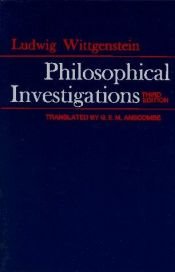Philosophical Investigations
Blurb
Philosophical Investigations is a highly influential work by the 20th-century philosopher Ludwig Wittgenstein. In it, Wittgenstein discusses numerous problems and puzzles in the fields of semantics, logic, philosophy of mathematics, philosophy of psychology, philosophy of action, and the philosophy of mind. He puts forth the view that conceptual confusions surrounding language use are at the root of most philosophical problems, contradicting or discarding much of what he argued in his earlier work, the Tractatus Logico-Philosophicus.He alleges that the problems are traceable to a set of related assumptions about the nature of language, which themselves presuppose a particular conception of the essence of language. This conception is considered and ultimately rejected for being too general; that is, as an essentialist account of the nature of language it is simply too narrow to be able to account for the variety of things we do with language. Wittgenstein begins the book with a quotation from St. Augustine, whom he cites as a proponent of the generalized and limited conception that he then summarizes:

 English
English Español
Español Deutsch
Deutsch










Member Reviews Write your own review
Be the first person to review
Log in to comment